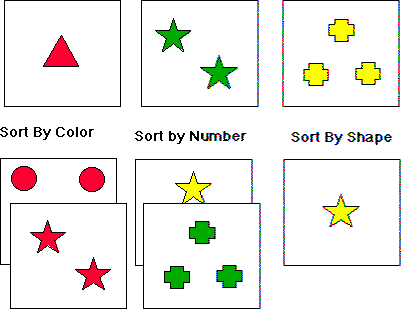Wisconsin card sort test
From Psy3241
The Wisconsin Card Sorting Test is a neuropsychological test of abstract thinking, planning, and the ability to alter mental sets as circumstances require, and to overcome the tendency to perseverate.
Contents |
How It Works
The Wisconsin Card Sorting Test consists of a special deck of 128 cards differing in color, form, and number of forms on each card (e.g. four blue circles, three green stars, one red triangle, etc.). The person being tested is provided with four different cards laid out in front of them by the person administering the test. They are given the remaining cards in the deck and asked to match each of the cards in the deck with its corresponding appropriate card, in one of the four piles previously laid out. They are not told how to match the cards (whether by color, shape, or number), but they are provided with feedback by the administer, as to whether they've matched the cards correctly. Also, after a few trials, the administer will change the "rule" that the cards are being matched by (color, shape, or number), and the person being tested has to quickly shift their mindset to accommodate the new "rule", displaying flexibility (see example below).
Computers
The Wisconsin Card Sorting Test, as described above, was originally used with an actual deck of paper cards. However, beginning in the 1990's, computerized versions of the test began being administered. The use of computers for administering the Wisconsin Card Sorting Test has helped because it can automatically score the test. The original test was quite complex to score. Also, the computerized version takes only 12-20 minutes to administer and generates a number of different psychometric scores, including numbers, percentages, and percentiles of: categories achieved, trials, errors, and perseverative errors.
What Is It Used For?
The Wisconsin Card Sorting Test is primarily used by neuropsychologists to test the cognitive abilities (such as memory and attention) of people who have acquired brain damage, a neurodegenerative disease, or mental illness (such as schizophrenia). People with frontal lobe damage usually perform the poorest on this test, and tend to sort much more slowly than normal subjects, and they make much more perseverative errors than normals. Perseverative errors occur when they continue to sort according to the old "rule", even though it doesn't apply anymore.

